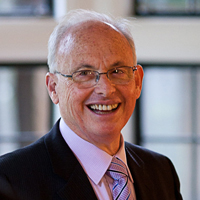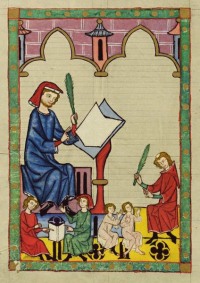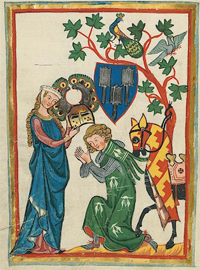 The twenty-first century has brought many changes to the Academy, a sign of the organization keeping up with the times. New services for members and ways of delivering those services combined with maintaining traditional functions have increasingly pressed the existing structure of administration. The staff in the Cambridge office and the members of many committees have been largely successful in getting all the jobs done, but there were increasing signs that old forms, in place since the middle of the last century, were under stress. The sudden, unexpected resignation of the former Executive Directors in April of this year led the Council to seize the initiative and address what were growing problems for the proper functioning of the Academy.
The twenty-first century has brought many changes to the Academy, a sign of the organization keeping up with the times. New services for members and ways of delivering those services combined with maintaining traditional functions have increasingly pressed the existing structure of administration. The staff in the Cambridge office and the members of many committees have been largely successful in getting all the jobs done, but there were increasing signs that old forms, in place since the middle of the last century, were under stress. The sudden, unexpected resignation of the former Executive Directors in April of this year led the Council to seize the initiative and address what were growing problems for the proper functioning of the Academy.
First, the Council had to address immediately the staffing of the Cambridge office. We were extremely fortunate to find two people, both of them with experience of the operations of the Academy, both in the Boston area, and both willing to take on work for us, who stepped in on very short notice. Jacqueline Brown immediately set to work as Acting Editor of Speculum and Director of Academy Publications to be sure no momentum was lost in maintaining the quality of our journal. She has accomplished a great deal in her short time in office, speeding up the process of publication so that the periodicity of
Speculum can be restored and readers as well as authors need not wait as long to see work in print, or online. Jackie has taken on the task temporarily because of her devotion to the Academy and to the journal she has been involved with for some years. We are deeply indebted to her for returning to the Academy to help in dramatically changed circumstances. Lisa Fagin Davis was able to reorganize her scholarly and teaching commitments and reallocate her work so that she could work four-fifths time as Acting Executive Director. She took charge of the office exactly one month before the move which brought the Academy to a new address. She was able, in between packing and then unpacking, to be sure that all day-to-day membership services continued and were kept up to date. Her familiarity with operations from an earlier period of work in the office certainly has proven an asset. She has been very important to continuity in this period of transition.
Second, the Council decided to divide the tasks of Executive Director and Editor of Speculum. Rick Emmerson, when he stepped down from the combined post in 2006, pointed to the rising workload and the difficulties for one individual to edit the journal while dealing with a growing range of responsibilities from the expanded publication program and increased membership activities. Over the next few years the presidential officers and the Council were involved in a series of actions taken to clarify and solidify the administration of the Academy, in the process addressing some of the problems Rick Emmerson had identified. Peggy Brown oversaw an extensive revision of the by-laws, the first in many years. It was a process that called on the expertise of an ad hoc committee and involved lengthy deliberation by the full Council. Her successor, Alice Mary Talbot, guided the Council and staff through the production of an Administrative Handbook. That detailed description of the activities of the Academy and of the responsibilities of various committees and officers is available online and is updated periodically. The Treasurer, Gene Lyman, and the Finance Committee he chairs have in recent years brought in fuller and more up-to-date financial reporting, making the books more transparent and assuring compliance with existing legislation. The Executive Directors, Ron Musto and Eileen Gardiner, took on the task of drafting an Employee Handbook so staff would enjoy a level of information about their responsibilities and benefits which the Administrative Handbook gives to the volunteer members who serve the Academy. They expanded the role of electronic communication in the functioning of the organization, in the editing of Speculum, and, more obviously, in improvements in the web site as well as making the journal available in electronic as well as print form. Last year Maryanne Kowaleski oversaw the last revisions of the Handbooks and took on the task of implementing many of the changes set in motion by her immediate predecessors.
Despite all those accomplishments it was clear by this Spring that the growth in Academy activities was placing extremely varied burdens on the Executive Director, so testing the limits of the skills of anyone in that office. The Action Planning Committee, approved by the Council at the Knoxville meeting, was to take on a number of matters to do with Academy operations, exploiting the hardwon opportunity for new directions created by the hard work of the previous years. The need to deal with urgent matters of staffing forced the suspension of the work of that Committee. The Council decided to attack one major issue immediately and that was to separate the responsibilities of the journal editor and the Executive Director. Many other societies, larger and smaller than the Academy, have a separate editorial team, often located at a university and so located a distance from the administrative offices. For some years there had been discussion of dividing off some of the responsibilities of the Executive Director. The Council chose in May to create something similar to the pattern in similar learned societies. The goal was, above all, to address what appeared to be essential structural problems. A search is now under way for a new editor of Speculum.
Because of the reliance on electronic communication the new editor will not have to be resident in Cambridge, a clear advantage. The considerable interest in the job and the range of qualified applicants who have put their names forward will make the task of selecting the individual or individuals responsible a difficult one for the search committee composed of Christopher Baswell, Susan Einbinder, Cynthia Hahn, and Cary Nederman with me as chair.
With what will be, I am confident, a successful search for a new officer responsible for Speculum the Academy will set about looking for an Executive Director to take on the operations of the office in Cambridge. The Council will in the next few weeks be working on drafting a precise job description and with it an advertisement for the post. That will not be easy since the responsibilities of the incumbent will be so varied and different from what the Executive Director has done in the past. Despite the difficulties of establishing the parameters of the post the search, chaired by the current First Vice President, Bill Jordan, will be under way by the end of the year. Once the two new staff members are in place, the Council will turn to the task of revising the bylaws and the Administrative Handbook to reflect the new arrangements. There will be a short period of adjustment during the transition to a new structure, but recent experience suggests that the process will be a smooth one.
During all of the dramatic changes of the last five years and more the Academy has continued to thrive, with the time from submission of articles to decision for Speculum shortening, the journal being made available solely online for those who opt for it, an expansion of digital initiatives, a series of successful meetings held at different sites across the continent, all while sharply improving the financial health of the organization, the last accomplished despite a world-wide financial meltdown. All this has been achieved through the good work of the staff, past and present, of the office in Cambridge. The results have come thanks to the efforts of my predecessors and of my successors, of the Treasurer and all those who have served on the Council, volunteers all of whom have given of their time and energy to ensure the success of the Academy and of medieval studies both in North America and around the globe. All of us are grateful to them for what they have done. The commitment of those medievalists indicates the strength of the field and the chances for success of the scholarly enterprise over the long term. Historians especially but medievalists in general do, of necessity, think in terms of lengthy periods of time. All of us should keep on doing just that.
Richard W. Unger
President





